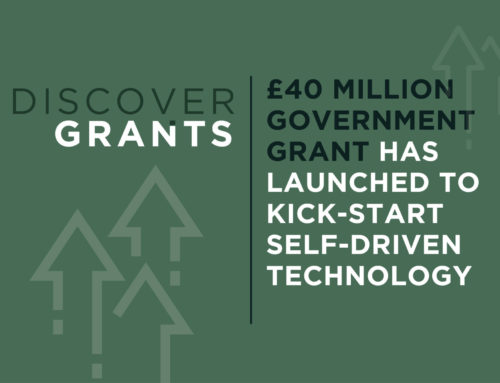Grant Funding in the UK: The Fundamentals
There is a whole wealth of opportunities for grant funding in the UK in both the public and private sectors. There’s an increased focus of grant funding that focuses on innovation, sustainability and COVID-19 recovery within the last year.
Who offers grant funding in the UK?
Grant funding is offered by a number of public and private sector bodies. There are many grants for businesses available, no matter their size, from small start-ups to big multinationals. The UK government and the National Lottery are a couple of the largest providers of grant funding in the UK.
The UK government provides billions of pounds a year in grant funding for businesses in the UK. They fund a multitude of different industries and sectors providing grant funding for businesses.
Some of the most common types of projects that are supported by grants are:
- Educational projects
- Innovative solutions
- Charity grants
- Start-up businesses
- Research and development (R&D)
- Arts and culture
- Health and wellbeing
- Sustainable solutions
- Council business grants
- Projects supporting local communities
- Projects and initiatives supporting the aid of COVID-19 recovery.
The benefits of grant funding
The advantages of receiving grant funding are that you don’t need to repay the money awarded to you. Additionally, you are able to receive an increase in investment without losing control of your business. Securing cash grants for small businesses can also improve your confidence, knowing that your venture is endorsed via an external body.
You don’t need to pay the money back if you succeed in securing a grant. However, there will be consequences if you falsify claims in order to be awarded a grant. Funders want to see their money go towards a worthy cause. They want to be sure that their money will provide a long-term solution and return on investment.
The challenges of grant funding
Pretty much every grant funding scheme works differently and has different requirements and eligibility criteria. Often schemes will have a limit on the amount of funding you can receive. This could result in only part of your requirements being met. This could result in leaving you to find additional ways to foot the bill.
Particularly due to the COVID-19 pandemic and its impact on many businesses there has been increased competition for grant funding. Gaining funding is proving to be more of a struggle due to the increase of businesses applying for help.
How to find the right grant funding for your business
Ultimately you want to find the best possible and most suitable grant funding opportunity for your business. You should find one that fits your project as much as possible. Don’t try to make your project fit a funders brief. A business should ensure that the funder’s objectives, aims and eligibility criteria fit your own. If they don’t, they’re likely not going to be the most suitable funder for you. In this case, it’s best to keep looking.
A useful way to find the right grant funding opportunity for your business is by conducting a SWOT analysis. By assessing the strengths, weaknesses opportunities and threats, you’ll be able to see if they’re right for you.
Most likely, you can only apply for funding in the same geographic area as your business. For example, if you have a business in Scotland, you can apply for The Scottish National Lottery Community Fund. Your businesses would not be eligible for Lottery funding opportunities in Wales. Funders like to keep it local allowing the funding to benefit local communities.
6 things to consider in the grant application process:
-
What are funders looking for?
Funders are ultimately looking for projects and businesses that align with their own goals. Different funders look for different things, so it’s best to check each individual opportunity to see their requirements.
- Location
- Local communities
- Who will benefit
- The problem you’re addressing.
-
Plan well in advance
When applying for a grant, you need to plan efficiently and well in advance. Completing your bid may take weeks or even months. To write a successful bid, you need to ensure you have your response thoroughly planned out in plenty of time.
It’s important to be realistic when planning your response. You want to set yourself and your team realistic and achievable internal deadlines. This will help maintain a calm status quo. You should make sure you plan in additional time for any unexpected delays or challenges that may delay your submission. It’s better to be over-prepared, than under-prepared!
Making a checklist of key dates and requirements is a good way to start. You could include:
- What format the application is
- Registering or creating an account
- The submission deadline date and time
- How to submit the application (online, as a hardcopy or video etc)
- Any support material that’s needed
- The number of copies that are required
- Any additional attachments
- The number of pages or word count required.
-
Consider the things from the funder’s perspective
When writing your response, consider things from the funder’s perspective. You should ask yourself what you would like to see and know if you were a funder on this project. Address their aims directly as they have an overall vision they’re trying to achieve. You should be demonstrating that you can deliver this in line with their key set of guiding principles.
Your application should state clearly how you will be achieving their goals and vision. That could be through COVID-19 recovery, supporting local communities and so on. The awarding body wants to feel understood and that their agenda will be met – if not exceeded.
A Grant Writing Consultant can help you convey your project or business accurately to a funder. They can help you bid for funding efficiently, giving you an advantage over your competitors.
-
Consider the format for applications
The format for grant funding applications in the UK will vary depending on the funder. You may need to register and have an account or take a quiz. Below are some examples of the format for grant funding applications. These are specific examples of each one independently. When applying for a grant, it’s best to check their website to find out what they require.
National Lottery Funding
The National Lottery funds a wide range of opportunities across the UK. They award grants to various charities, not-for-profit organisations, businesses, projects and communities. Their funding is typically split between those under £10,000 and over £10,000
For any National Lottery Fund grant, you’ll need to state where your project will take place. Whether it’s in England, Northern Ireland, Scotland or Wales. Depending on the opportunity, you might need to fill out a form providing basic information on your business or project. It should be filled out as fully as possible, you should answer the questions to the best of your ability. They’ll then get in contact if they are interested in taking it any further.
Some grant funding opportunities will allow you to send an email or video instead of completing the online form. It will state on the opportunity if this is an option. Often videos shouldn’t be longer than five minutes. You may need to include the following information if you decide to make a video:
- The name of your project
- What your organisation does
- How much money you’ll need and how long will you need it for?
- What you would like to do
- Where the project will take place
- The demand for the service
- Who will benefit from the project?
- What difference will your project make
- Why you’re best placed to deliver the project.
You may be required to answer more or less questions that relate specifically to the project at hand.
Arts Council – National Lottery Project Grants
The Arts Council have teamed up with the National Lottery and has £77.9 million in available grants until April 2021. They primarily focus on arts and culture projects involving local community and cultural organisations, museums and libraries and artists.
There are three steps in order to apply for funding:
- Take the quiz. This helps businesses to think about different aspects of their projects, helping them get ready for the application process.
- Read the guidance. Businesses should read all the documents and supplementary guidance that’s available for the grant.
- Register on Grantium. In order to apply for Arts Council grants, you must register on their online portal, Grantium. Each account needs to be verified, so it’s best to do this as soon as possible.
Innovate UK
There are two application processes for Innovate UK grant funding. These are:
- Digital Innovation Funding Service
You’ll need to create an account with the Innovation Funding Service in order to apply for any Innovate UK opportunities. All sections within the application must be completed before you submit it.
- File Transfer Protocol (FTP)
The FTP is used by Innovate UK for some opportunities that aren’t able to otherwise use the Innovation Funding Service. It is sometimes used for international competitions and these funding opportunities will require you to register to apply online.
Registration for these opportunities closes at midday one week before the relevant grant funding submission deadline.
Once you have registered on the FTP, you will receive an email that contains:
- Your username
- Password
- Unique application form
- Secure FTP site URL.
Any applications that are submitted by email will not be considered by Innovate UK unless stated otherwise.
Once you click on the FTP site URL, you’ll be taken to the public down area. Here you’re able to find the downloadable documents that are needed for the competition. You will need to sign-in, in order to submit your application for Innovate UK opportunities.
-
Realistically evaluate your finances and running costs
The grant application process is there for businesses to seek financial support and investment. You should realistically evaluate your finances and running costs. Funders want you to demonstrate that their money is safe in your hands. You will need a sound methodology for money management and use.
It’s helpful to look over and include past projects where you have managed cash flow effectively. This will help you demonstrate your capabilities and will gain the funder trust. You should consider and present the following:
- A cash-flow analysis for the use of money
- A fully costed project
- The financial safeguards and controls you have in place
- A business plan for the implementation of the project
- The degree of financial knowledge and skills within your organisation
- A previous annual report
- Your organisation’s annual income and expenditure.
-
What you need to apply
In order to apply for UK grant funding, you may need to provide the following in the application process:
-
Details about your organisation
Typically, a funder wants to know who they’ll be giving potentially millions of pounds to. So, you will need to provide information about your organisation. This can include the legal name, address of your organisation and what type of organisation it is. For example, a charity, a business, a not-for-profit and so on.
-
Your organisation’s accounts
Your organisation’s accounts, including the date your accounts end each year, will most likely be required. You may need to state your annual turnover too. Don’t worry if you are a start-up or newly formed organisation and don’t have an account yet. This doesn’t mean you will be disqualified. You will likely need to speak to the funders explaining the situation and they’ll give you an alternative option.
-
A bank statement from the last three months
A bank statement from the last three months may be required at the initial stages of a grant application process. It should show your organisation’s legal name, the address the statements are sent to and what bank you’re with. It should also include your organisation’s sort code and account number.
-
The details of two people from your organisation
Some funders may require the information of two employees from your organisation during the grant funding process. This is so they are able to contact them if they have any questions about the initial application form. Often, one should be a senior member of your team. Their names, email, contact number, home address and date of birth may be required. It’s best to have these prepared ahead of time to save you time.
If you need help on how to bid for funding, check out our 10 useful tips for securing funding successfully.
Need support?
If you’re overwhelmed by all the grant funding opportunities within the UK, Discover Grants can help. We can help you find the right opportunity for your business saving you time and resources. Watch a demo on how Discover Grants can help your business get grant funding.
Our Grant Tracker service is live and hosts all the latest grant opportunities in the UK from 1,500 data points. Opportunities are manually tracked, enabling for accurate keyword labelling, optimising your search for the perfect grant.
Sign up now!
Find more helpful tips and advice in our blogs. We cover topics including:
- How a Grant Writing Consultant can help your business
- Innovate UK grants
- Start-up business grants
- Business grants in the UK
- How to apply for a government grant
- Working with Grant Writers
- Bidding for funding
- Council business grants
- Government funding
- Grant writing help
- And many more.





